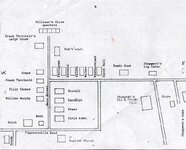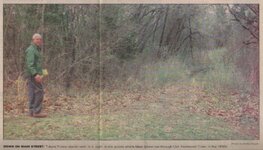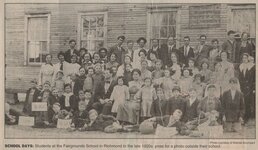Gypsy Heart
Gold Member
Date of article unknown. From Tupelo Daily Journal.
Richmond- A pile of jumbled boards sits stolidly in the wind and sun where once the town of Richmond ran. Not even a moldy brick is left of the downtown stores, nor a single trace of the street itself.
North of Lamont Posey's house where the town used to be there is grass and cedar trees, a small breeze and a few birds. Off on a far hill a cow calls to its calf, and the last cardinal wings away to the west, leaving the silence and the memory of what man built and time destroyed.
Down the winding road a short distance to the east, the remains of an old house huddles behind a row of ancient cedars, staring with blank windows at a herd of cattle roaming in its yard. This is the F.W. Reedy home, originally built in the the old Richmond before the Civil War by the grandfather of Lamont Posey, and later dismantled and moved to its present, and last, location.
Long before the War Between the States flared in all its bitter glory, the town of Richmond was a thriving community in Lee County six miles south of the present town of Mooreville. According to an excellent history of the place compiled ten years ago by James T. Pettigrew of Tupelo, Arch Thomason was the first settler there, but records fail to show whether he was one of the merchants of the town.
By the time the enemity between the North and South had grown into a full-fledged Civil War, Richmond had become a prominent trade center with about a dozen business establishments. The owners and operators of some of these early stores have been lost in the shuffle of time, but some names are remembered.
Richmond's main street began almost exactly where Lamont Posey's house stands today on the Plantersville road and ran north. On the west side of the street there were the stores of merchants Murphy, Thelkeld, and Crane. On the east and nearer the south end of the street were the business places of Stovall, Randolph and Evans, the latter being a drug store as well as a grocery and general supply.
On the north side of a street that ran from east from Main street were several stores, at least two of which were of brick construction. One of these was the Pettigrew store, which went out of operation just before the Civil War when the owner died. On this same street store owners Raymond, Walker and others unidentified operated their businesses.
In the early pioneer days of north Mississippi, saloons and dance halls ran wide open. Old Richmond legend has it that the operator of the Richmond saloon was a man who liked his daily nip, but didn't like to indulge before his customers. So he crawled under the floor of the saloon, bored a hole into the whiskey barrel above and put a stopper in it. This method worked fine until one day when he went to take his daily toddy, the stopper broke off in his hand.
The customers above were astounded to hear a voice from below yell: "Great jumpin' Jesophat' Come a runnin. Marthy, good liquors' running all over the place!"
Tis said that the man and his wife and assorted children of the family filled every bucket, jug and wash pan on the place before another stopper could be found.
Richmond had a hotel, a woodworking shop ran by a man named Webb, and the Williams' slave quarters. Educational facilities in the town were good, with both a female academy and a boys' school, located at opposite ends of Main street. In 1845 the Richmond Baptist church was established and continues today down in the so-called 'new' Richmond a mile east of the original town.
Progress is a capricious mistress who decided to desert Richmond, for when the town was begun the people had contact with the outside world by wagon and stagecoach. They traveled by wagon to the Tombigbee river and to Old Town Creek at the now-lost town of Carmigo near Nettleton. Water transportation took over from there.
But the railroad, bugaboo of countless small towns not located where the steel tracks wanted to run, bypassed Richmond for Verona. When the GM and O went through Verona, it was the beginning of the end for Richmond. The little town nursed its Civil War scars and watched the world get farther and farther away.
One by one the business houses closed down and people moved away to the hustle and bustle of a progressing world. The girls' academy was sold, torn down and used to build a store in Shannon. When the Frisco railroad turned its back on Richmond, too, the final curtain fell. The last storekeeper, Roman Thomas, moved to Plantersville. The boys school was moved to Evergreen.
The grass grew, the years passed by Richmond with a heavy hand and all the physical vestiges of the town vanished in the weeds and trees. The earth put a covering mantle of soil and vegetation where Richmond had been and wiped away the last evidence of man's handiwork.
But this is not the end of the story. Man builds and time destroys his work, but all the years of eternity can do nothing to memory. Richmond still lives in the legends and talk of the descendants of its founders.
And as long as there is a human race, there will be memory.
Richmond- A pile of jumbled boards sits stolidly in the wind and sun where once the town of Richmond ran. Not even a moldy brick is left of the downtown stores, nor a single trace of the street itself.
North of Lamont Posey's house where the town used to be there is grass and cedar trees, a small breeze and a few birds. Off on a far hill a cow calls to its calf, and the last cardinal wings away to the west, leaving the silence and the memory of what man built and time destroyed.
Down the winding road a short distance to the east, the remains of an old house huddles behind a row of ancient cedars, staring with blank windows at a herd of cattle roaming in its yard. This is the F.W. Reedy home, originally built in the the old Richmond before the Civil War by the grandfather of Lamont Posey, and later dismantled and moved to its present, and last, location.
Long before the War Between the States flared in all its bitter glory, the town of Richmond was a thriving community in Lee County six miles south of the present town of Mooreville. According to an excellent history of the place compiled ten years ago by James T. Pettigrew of Tupelo, Arch Thomason was the first settler there, but records fail to show whether he was one of the merchants of the town.
By the time the enemity between the North and South had grown into a full-fledged Civil War, Richmond had become a prominent trade center with about a dozen business establishments. The owners and operators of some of these early stores have been lost in the shuffle of time, but some names are remembered.
Richmond's main street began almost exactly where Lamont Posey's house stands today on the Plantersville road and ran north. On the west side of the street there were the stores of merchants Murphy, Thelkeld, and Crane. On the east and nearer the south end of the street were the business places of Stovall, Randolph and Evans, the latter being a drug store as well as a grocery and general supply.
On the north side of a street that ran from east from Main street were several stores, at least two of which were of brick construction. One of these was the Pettigrew store, which went out of operation just before the Civil War when the owner died. On this same street store owners Raymond, Walker and others unidentified operated their businesses.
In the early pioneer days of north Mississippi, saloons and dance halls ran wide open. Old Richmond legend has it that the operator of the Richmond saloon was a man who liked his daily nip, but didn't like to indulge before his customers. So he crawled under the floor of the saloon, bored a hole into the whiskey barrel above and put a stopper in it. This method worked fine until one day when he went to take his daily toddy, the stopper broke off in his hand.
The customers above were astounded to hear a voice from below yell: "Great jumpin' Jesophat' Come a runnin. Marthy, good liquors' running all over the place!"
Tis said that the man and his wife and assorted children of the family filled every bucket, jug and wash pan on the place before another stopper could be found.
Richmond had a hotel, a woodworking shop ran by a man named Webb, and the Williams' slave quarters. Educational facilities in the town were good, with both a female academy and a boys' school, located at opposite ends of Main street. In 1845 the Richmond Baptist church was established and continues today down in the so-called 'new' Richmond a mile east of the original town.
Progress is a capricious mistress who decided to desert Richmond, for when the town was begun the people had contact with the outside world by wagon and stagecoach. They traveled by wagon to the Tombigbee river and to Old Town Creek at the now-lost town of Carmigo near Nettleton. Water transportation took over from there.
But the railroad, bugaboo of countless small towns not located where the steel tracks wanted to run, bypassed Richmond for Verona. When the GM and O went through Verona, it was the beginning of the end for Richmond. The little town nursed its Civil War scars and watched the world get farther and farther away.
One by one the business houses closed down and people moved away to the hustle and bustle of a progressing world. The girls' academy was sold, torn down and used to build a store in Shannon. When the Frisco railroad turned its back on Richmond, too, the final curtain fell. The last storekeeper, Roman Thomas, moved to Plantersville. The boys school was moved to Evergreen.
The grass grew, the years passed by Richmond with a heavy hand and all the physical vestiges of the town vanished in the weeds and trees. The earth put a covering mantle of soil and vegetation where Richmond had been and wiped away the last evidence of man's handiwork.
But this is not the end of the story. Man builds and time destroys his work, but all the years of eternity can do nothing to memory. Richmond still lives in the legends and talk of the descendants of its founders.
And as long as there is a human race, there will be memory.










